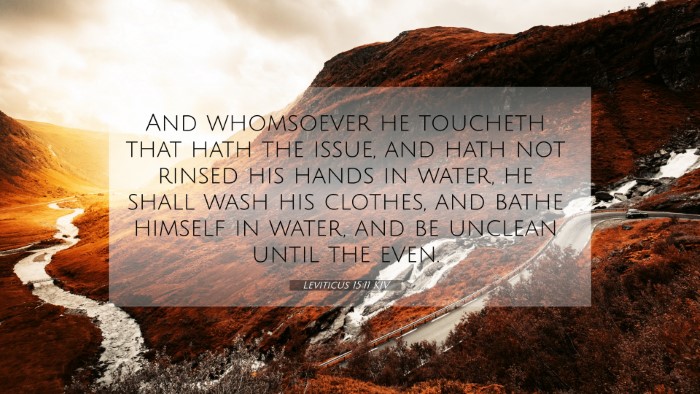Understanding Leviticus 15:11
Bible Verse: Leviticus 15:11 - "And whomsoever he toucheth that hath the issue, and hath not rinsed his hands in water, he shall wash his clothes, and bathe himself in water, and be unclean until the even."
Summary of Meaning
This verse addresses the laws concerning personal cleanliness and purity within the context of the Levitical code. It emphasizes the importance of ritual washing and the need for cleanliness when dealing with bodily discharges, which were considered a source of ceremonial defilement.
Insights from Public Domain Commentaries
Matthew Henry's Commentary
Matthew Henry emphasizes the seriousness of ceremonial purity in the Old Testament. He points out that physical cleanliness symbolizes spiritual cleanliness. The act of washing indicates the need for sanctification, reminding us that our interactions with the unclean require precautions to maintain one's holiness.
Albert Barnes' Notes
Albert Barnes highlights the practical implications of this directive for the Israelites. He explains that the laws about touching someone with an issue were meant to instruct the people in the importance of avoiding contamination. It serves as a reminder that both spiritual and physical union necessitates careful attention to purity.
Adam Clarke's Commentary
Adam Clarke gives particular attention to the necessity of washing and bathing as part of the ritual. He clarifies that the command illustrates the broader principle of maintaining a distinction between the clean and the unclean, which is crucial in God’s covenant with His people.
Bible Cross-References
- Numbers 19:11-22 - Details about touching a dead body and the required cleansing rituals.
- 2 Corinthians 6:17 - A call to come out from among the unclean, establishing the theme of separation from impurity.
- Hebrews 9:13-14 - A comparison of the cleansing of the flesh with the need for the spiritual purification of the conscience.
- Ezekiel 36:25 - God's promise to cleanse His people who have been made unclean.
- John 13:10 - Jesus speaks of spiritual cleanliness in His discourse on washing His disciples' feet.
- Romans 12:1 - The call to present our bodies as living sacrifices, holy and acceptable, aligning with the theme of purity.
- 1 Corinthians 6:19-20 - The significance of honoring God with our bodies relates to the concept of cleanliness.
Thematic Bible Verse Connections
The themes of cleanliness and separation as depicted in Leviticus 15:11 resonate through various parts of Scripture. This verse connects with ideas of moral purity and spiritual integrity in both the Old and New Testaments.
Practical Applications
- Personal Hygiene: Encourages maintaining physical cleanliness as a reflection of spiritual health.
- Spiritual Vigilance: Highlights the necessity of being mindful of influences that may compromise one's spiritual state.
- Community Responsibility: Reflects on the duty we have to protect one another’s spiritual well-being through our actions.
Conclusion
Leviticus 15:11 serves not only as a guideline for physical hygiene but also establishes a deeper principle of maintaining spiritual purity. The connections with other biblical texts reinforce its relevance and the call to remain holy in our relationships and conduct.


